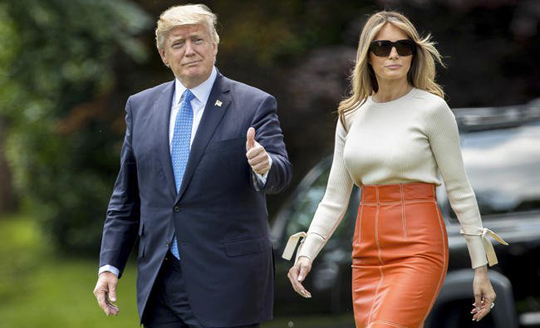Riyadh, May 20: President Donald Trump is set to arrive in Saudi Arabia on Saturday morning, for a historic meeting tipped to “turn the page” on US-Arab affairs after a strained relationship under the previous American administration.

Shortly after the president touches down in Riyadh aboard Air Force One, he will engage in a series of diplomatic meetings with King Salman and senior Saudi officials.
Trump’s first official foreign trip since taking office will coincide with three key summits on Saturday and Sunday, as well as several business activities, cultural, intellectual and sports celebrations.
The Saudi-US Summit on Saturday will feature a series of bilateral meetings between King Salman and Trump, and “focus on re-affirming the long-standing friendship, and strengthening the close political, economic, security and cultural bonds between the two nations.”
It will be followed Sunday by the GCC-US Summit, Arab Islamic American Summit, and the inauguration of the Global Center for Combating Extremist Ideology.
Experts told Arab News that the visit by Trump will boost US-Arab ties after the relationship soured under his predecessor President Barack Obama.
“By selecting Saudi Arabia as the first stop on his historic visit, the first official one to any foreign country, President Trump has been prudent to seize an opportunity to turn a new and more positive page toward Arabs and Muslims in the region and beyond,” John Duke Anthony, founding president and CEO of the National Council on US-Arab Relations, writes on page seven.
“The president’s visit has a chance to begin healing wounds that have been inflicted on Muslims the world over.” Anthony said that there has been a shift from Trump’s presidential campaign, when he was seen as being openly hostile toward the Muslim world and Kingdom.
“As a candidate for the Oval Office, Donald Trump was not shy about criticizing Saudi Arabia. Contexts change, though, and as president, his administration has refrained from unjustified, unnecessary and provocative statements in this regard,” he writes.
Tensions rose between the Arabian Gulf and the US after the latter brokered the “nuclear deal” with Iran, which some Arab countries claim meddles in regional affairs and sponsors international terrorism.
Abdulrahman Al-Rashed, a veteran analyst, said that the new US administration has the opportunity to get tough on Tehran.
“Iran has taken the region hostage and has blackmailed Washington for many years,” he writes on page eight.
“I believe it is in the hands of the current US administration to get Iran to face a new reality, namely that it must stop the spread of chaos and violence in the region and wider world.”






Comments
Add new comment